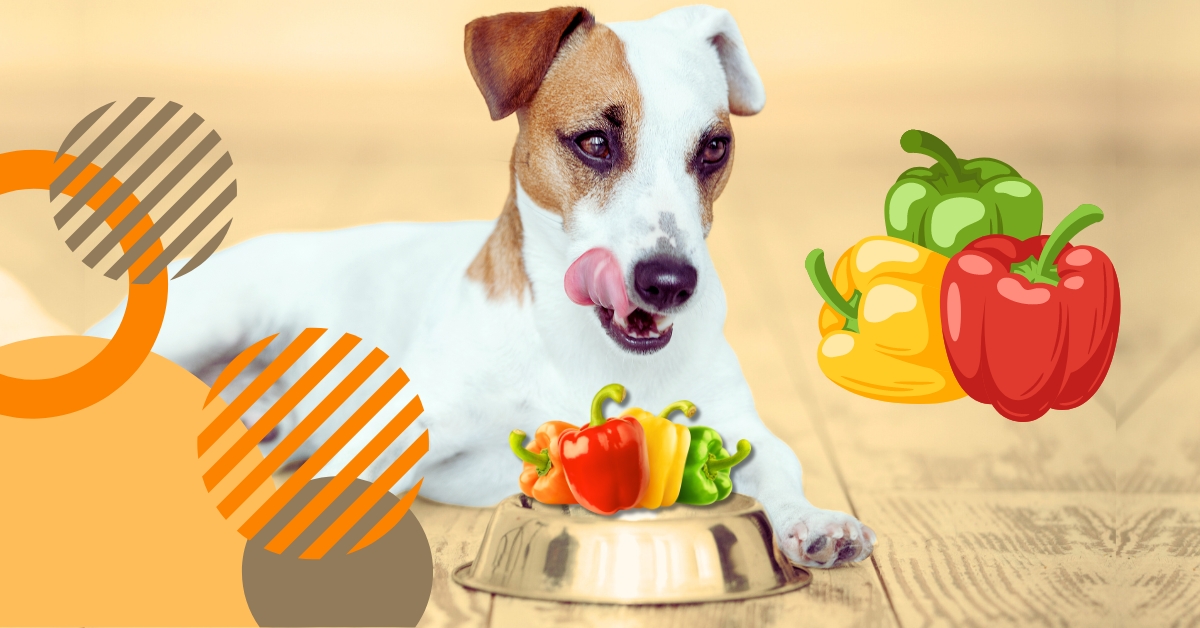As a pet owner, you’re always on the lookout for healthy, dog-friendly snacks that can supplement your furry friend’s diet. You might have wondered, “Can dogs eat bell peppers?” The answer is yes! Bell peppers are not only safe for dogs, but they also offer several health benefits. Whether you’re thinking of adding red, green, or yellow bell peppers to your dog’s diet, this nutrient-packed vegetable can be a great low-calorie treat. In this article, we’ll cover 5 amazing health benefits of bell peppers for dogs, how to safely serve them, and the right portion sizes for your pet.
Can Dogs Eat Bell Peppers? Nutritional Value and Safety
Bell peppers are an excellent source of essential vitamins and minerals that are beneficial for dogs. In fact, you might be wondering, can dogs eat bell peppers? The answer is yes! These brightly colored vegetables are packed with nutrients, including vitamins A, C, and E, along with a variety of antioxidants that promote good health.
Key Nutritional Benefits of Bell Peppers for Dogs
- Vitamin A: Essential for maintaining eye health, immune function, and a healthy coat.
- Vitamin C: Supports the immune system and aids in collagen production, which is important for skin and joint health.
- Vitamin E: Acts as an antioxidant, helping to protect cells from damage and supporting healthy skin and coat.
- Antioxidants: Bell peppers contain a wide range of antioxidants that help fight free radicals, which can contribute to aging and disease.
Are Bell Peppers Safe for Dogs?
Yes, bell peppers are safe for dogs to eat, but they should always be given in moderation. While bell peppers offer many health benefits, it’s important to introduce them slowly into your dog’s diet to ensure they don’t cause any digestive upset. Also, make sure the peppers are properly prepared, as dogs can have difficulty digesting some foods in their raw form.
Red, Green, or Yellow: Which Bell Pepper Is Best for Dogs?
All varieties of bell peppers—red, green, yellow, and even orange—are safe for dogs to eat, but they vary slightly in their nutritional content.
Red Bell Peppers: The Best Choice
Among the different types of bell peppers, red bell peppers are the most nutritious. They contain the highest levels of vitamins A and C, and they are also packed with beta-carotene, which supports eye health and can boost the immune system. Red bell peppers are a fantastic choice if you’re looking to maximize the nutritional benefits for your dog.
Green Bell Peppers
Green bell peppers are simply unripe versions of the red variety. They contain fewer nutrients compared to red bell peppers but are still a healthy option for dogs. They are lower in sugar, making them a good choice for dogs that need to watch their weight.
Yellow and Orange Bell Peppers
Yellow and orange bell peppers fall somewhere in between red and green in terms of nutritional value. They are also safe for dogs to eat and offer a milder flavor. These peppers still provide a good dose of vitamins A and C, as well as antioxidants, but not as much as the red variety.
In summary, red bell peppers offer the most nutrients, but green, yellow, and orange bell peppers are all safe and beneficial in moderation.
Can Dogs Eat Raw Bell Peppers?
Yes, dogs can eat raw bell peppers, but there are a few things to keep in mind. While raw bell peppers retain all of their nutrients, some dogs may find them harder to digest due to their tough skin. Raw bell peppers are also crunchier, which may appeal to dogs who enjoy crunchy snacks, but they should always be cut into small, manageable pieces to prevent choking, especially for smaller breeds.
Raw vs. Cooked Bell Peppers
Both raw and cooked bell peppers are safe for dogs, but cooking the peppers slightly can make them easier to digest. Cooking breaks down the tough skin and fibers, making the peppers softer and more palatable for dogs with sensitive stomachs. Just make sure not to add any seasoning, oils, or spices when cooking the peppers, as these can be harmful to your dog.
Introducing Raw Bell Peppers
When introducing raw bell peppers to your dog, start with small amounts to ensure they can tolerate it. Monitor for any signs of digestive upset, such as vomiting or diarrhea, and adjust the serving size accordingly.
How Many Bell Peppers Can Dogs Eat Safely?
While bell peppers are nutritious, they should be given in moderation to prevent digestive issues. As with any treat, it’s important to keep portion sizes small and to consider your dog’s overall diet. Too many bell peppers can cause gas or upset stomach due to their high fiber content.
Recommended Portion Sizes
Here’s a general guideline for feeding bell peppers to dogs:
- Small dogs: 1-2 small slices of bell pepper per day.
- Medium dogs: 3-4 slices per day.
- Large dogs: Up to half a bell pepper per day.
Remember, bell peppers should not replace a balanced diet but can be used as a supplement to your dog’s regular meals or as a healthy snack.
How to Serve Bell Peppers to Your Dog: Best Preparation Methods
When serving bell peppers to your dog, it’s important to prepare them correctly to avoid any potential risks. Here are some tips on the best preparation methods:
1. Remove the Seeds and Core
The seeds and core of bell peppers are not toxic, but they can be difficult for dogs to digest and may cause choking or digestive discomfort. Always remove these parts before offering the pepper to your dog.
2. Cut into Small Pieces
Chop the bell pepper into small, bite-sized pieces to make it easier for your dog to chew and digest. This is especially important for small dogs or dogs that tend to gulp their food.
3. Steamed or Lightly Cooked
If your dog has a sensitive stomach or difficulty chewing raw vegetables, try steaming or lightly cooking the bell peppers. This softens them and makes them easier to digest, while still preserving most of the nutrients.
4. Avoid Spices and Seasonings
Never add spices, salt, garlic, onions, or oils to the bell peppers you plan to feed your dog. These seasonings can be harmful to dogs and may cause toxic reactions.
In fact, you might be wondering, can dogs eat bell peppers? The answer is yes! These brightly colored vegetables are packed with nutrients, including vitamins A, C, and E, along with a variety of antioxidants that promote good health. For more information on this topic, you can check out this resource.
Other Dog-Friendly Vegetables Besides Bell Peppers
If your dog enjoys bell peppers, there are several other vegetables that are safe and healthy for dogs to eat. Adding variety to your dog’s diet can provide them with different nutrients and keep mealtime interesting.
1. Carrots
Carrots are rich in vitamin A and fiber, making them a crunchy and nutritious snack for dogs. They also help maintain dental health by naturally scraping away plaque.
2. Green Beans
Green beans are low in calories and high in fiber, making them a great option for dogs that need to watch their weight. They can be served raw or cooked without any seasoning.
3. Sweet Potatoes
Sweet potatoes are a rich source of fiber and beta-carotene. They are easy to digest and can help improve digestive health.
4. Cucumbers
Cucumbers are hydrating and low in calories, making them a refreshing snack for dogs, especially during hot weather.
Are Bell Peppers a Good Alternative to Store-Bought Dog Treats?
Yes, bell peppers are an excellent alternative to many commercial dog treats that are often loaded with sugar, fat, and artificial ingredients. Bell peppers are naturally low in calories, making them ideal for dogs that need to manage their weight or avoid unhealthy snacks.
Low-Calorie, Nutrient-Rich Snack
Bell peppers offer a variety of vitamins and antioxidants without adding unnecessary calories to your dog’s diet. This makes them perfect for dogs on a weight management plan or those that need a healthier option than store-bought treats.
Budget-Friendly and Safe
Compared to expensive dog treats, bell peppers are a cost-effective snack that you can easily incorporate into your dog’s diet. Since they’re safe and widely available, bell peppers can be an everyday treat without breaking the bank.
For those curious about unique dog breeds, don’t miss our insightful article on 12 Shocking Truths About White German Shepherds. Discover fascinating facts that will deepen your appreciation for this striking and intelligent breed!
Conclusion: Can Dogs Eat Bell Peppers? Yes, with Moderation!
So, can dogs eat bell peppers? Absolutely! Bell peppers are a safe and nutritious snack for dogs, providing a wealth of vitamins, antioxidants, and fiber. Whether raw or cooked, bell peppers can be a great addition to your dog’s diet, offering a low-calorie, nutrient-dense alternative to processed treats. Remember to feed bell peppers in moderation and always prepare them properly by removing the seeds and cutting them into bite-sized pieces. By offering bell peppers as part of a balanced diet, you can help keep your dog healthy, happy, and full of energy. So, the answer to the question, can dogs eat bell peppers, is a resounding yes when served appropriately!
FAQs About Can Dogs Eat Bell Peppers
- Can dogs eat bell peppers?
Yes, bell peppers are safe for dogs and provide numerous health benefits when served in moderation. - Are raw bell peppers safe for dogs?
Yes, dogs can eat raw bell peppers, but it’s best to cut them into small pieces to avoid choking. - Which bell pepper is best for dogs?
Red bell peppers are the most nutritious, but green, yellow, and orange bell peppers are also safe and beneficial. - How much bell pepper can I give my dog?
Small dogs can have 1-2 slices, medium dogs 3-4 slices, and large dogs up to half a bell pepper per day. - Can bell peppers upset a dog’s stomach?
In some cases, too many bell peppers can cause digestive upset, such as gas or diarrhea. Always feed in moderation. - Can dogs eat cooked bell peppers?
Yes, cooked bell peppers are easier to digest and can be a good option for dogs with sensitive stomachs. - Can dogs eat the seeds of bell peppers?
It’s best to remove the seeds and core, as they can be difficult for dogs to digest and may pose a choking hazard. - Are bell peppers good for weight management in dogs?
Yes, bell peppers are low in calories and can be a healthy snack for dogs that need to manage their weight. - Are there other vegetables dogs can eat?
Yes, vegetables like carrots, green beans, and sweet potatoes are also healthy options for dogs. - Can dogs eat spicy peppers like jalapeños?
No, spicy peppers like jalapeños can cause digestive upset and should never be given to dogs

Joseph Bush is a seasoned writer and researcher with over 7 years of experience covering a wide range of general topics, from lifestyle and technology to business and current events. He is dedicated to producing fact-checked, reader-friendly content that informs, engages, and empowers readers.
Throughout his career, Joseph has followed strict editorial guidelines, relied on reputable sources, and ensured every article meets the highest standards of accuracy and clarity. His expertise spans multiple fields, allowing him to explain complex topics in a way that’s easy to understand.
Passionate about continuous learning, Joseph stays updated on industry trends and best practices to deliver trustworthy, well-rounded insights. Readers can rely on his work for its credibility, depth, and real-world relevance.




